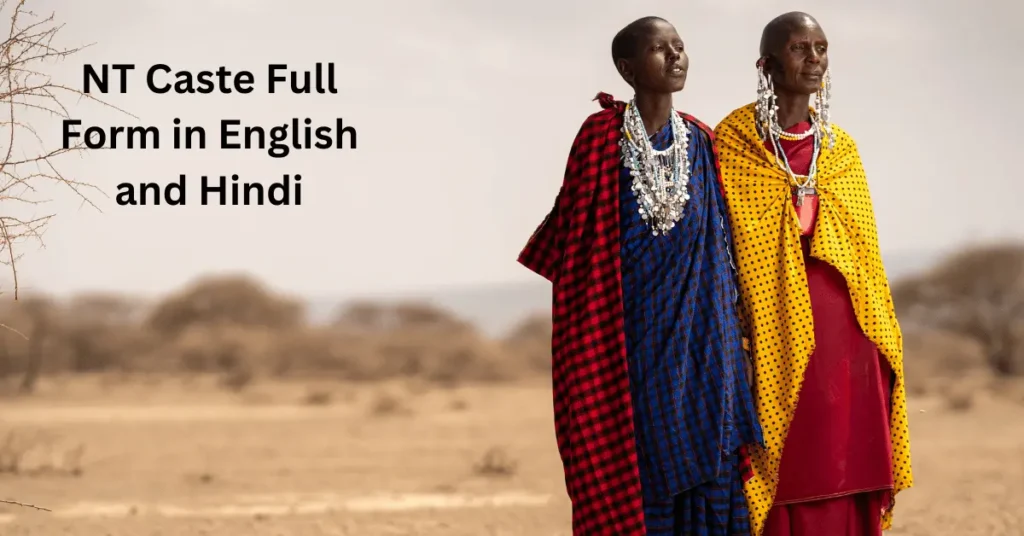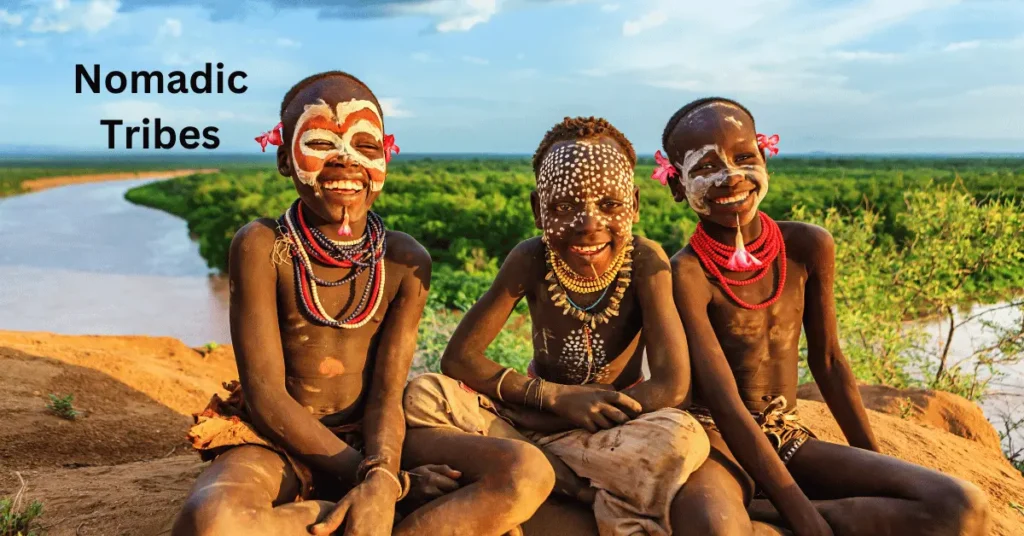NT Caste Full Form in English and Hindi

If you’ve ever come across the term “NT caste full form” and wondered what it means, you’re not alone! In India, caste classifications can sometimes be confusing, and “NT” is one such term that many people might not fully understand.
So, what exactly is the “NT caste full form”? Well, NT caste full form “Nomadic Tribes,” a group of communities that have historically led a mobile lifestyle, moving from place to place in search of work, trade, or resources.
In this article, we’ll dive into the meaning of NT caste, its significance, and answer some common questions about these communities. Let’s explore this topic in a simple and clear way!
What Does NT Stand For?
NT stands for Nomadic Tribes, a term used to describe communities that traditionally lead a mobile lifestyle. These tribes do not have a fixed or permanent place of residence.
Instead, they travel from one place to another, often in search of work, trade opportunities, or seasonal resources. The word “Nomadic” comes from the Latin word nomas, meaning “to wander” or “move around.”
Nomadic Tribes in India have a rich history of migration. Over time, they adapted to various occupations, such as trade, craftsmanship, and animal herding, all of which require a nomadic lifestyle.
While some tribes would move in specific seasonal cycles, others might travel throughout the year, depending on the nature of their work or economic needs.
These tribes are often categorized based on their unique customs, traditions, and occupations.
For example, some Nomadic Tribes are known for their skill in making crafts, while others may specialize in trading goods across regions or working as itinerant laborers.
Despite their lack of permanent settlement, these communities have preserved their distinctive cultural practices, languages, and social structures.
Over time, as modern society has evolved, many Nomadic Tribes have been encouraged to settle in one location to gain access to education, healthcare, and other social services.
However, the transition from a nomadic to a settled lifestyle has been challenging for some groups, as their way of life has been deeply intertwined with their mobility.
NT Caste Full Form in English

The full form of NT caste is Nomadic Tribes.
In the context of Indian society, the term “Nomadic Tribes” refers to various communities that have traditionally led a migratory or nomadic lifestyle, moving from one place to another instead of staying settled in one specific location.
These tribes have historically relied on different occupations that required them to travel, such as trading, herding livestock, and seasonal labor, which influenced their mobile way of life.
The term “Nomadic” in NT reflects their movement pattern – a lifestyle that often involved traveling from village to village or region to region based on seasonal needs, opportunities, or resources.
“Tribes” refers to the social structure of these communities, many of whom have distinct languages, cultures, and customs.
Nomadic Tribes have played a significant role in India’s history and economy. Many of these tribes were involved in trade, traveling long distances to exchange goods, and some even served as messengers or scouts for kingdoms in ancient times.
Over the years, their social structure and roles evolved, but the key characteristic remains their reliance on mobility.
Despite modernization and government initiatives aimed at providing stability, education, and healthcare, many Nomadic Tribes continue to face challenges related to their identity, social status, and access to basic services.
In India, the government recognizes certain Nomadic Tribes under various affirmative action programs, such as reservations in education and employment, to help uplift these communities.
NT Full Form in Hindi
NT जाति का पूरा नाम घुमंतू जातियाँ (Ghumantu Jatiyaan) है। यह शब्द उन समुदायों को संदर्भित करता है जो पारंपरिक रूप से एक घुमंतू या अस्थिर जीवनशैली अपनाते हैं। ये जातियाँ स्थायी रूप से एक स्थान पर निवास नहीं करतीं, बल्कि विभिन्न स्थानों पर यात्रा करती हैं। ये समुदाय अपने आजीविका के लिए व्यापार, श्रम, पशुपालन या अन्य सीजनल कार्यों पर निर्भर रहते हैं, जिसके कारण इनका जीवन हमेशा गतिशील रहता है।
“घुमंतू” शब्द इन समुदायों के जीवनशैली को दर्शाता है, जिनकी जीवनचर्या एक स्थान से दूसरे स्थान पर घूमने और काम की तलाश करने की होती है। “जातियाँ” शब्द इन समुदायों की सामाजिक संरचना को बताता है, जो आमतौर पर अपने विशेष रीति-रिवाजों, भाषा और संस्कृति से पहचानी जाती हैं।
भारत में घुमंतू जातियों का ऐतिहासिक महत्व रहा है। यह समुदाय व्यापार, कारीगरी, और अन्य पारंपरिक रोजगारों में माहिर होते थे, और अक्सर विभिन्न क्षेत्रों में अपने सामान का व्यापार करते थे। कुछ घुमंतू जातियाँ आज भी अपने पारंपरिक जीवनशैली को बनाए रखते हुए यात्रा करती हैं। हालांकि, समय के साथ, इन जातियों को स्थायी रूप से बसने और शिक्षा, स्वास्थ्य, और सरकारी सेवाओं का लाभ लेने के लिए प्रोत्साहित किया गया है।
हालाँकि, इन जातियों के लिए स्थायी जीवनशैली की ओर बढ़ना आसान नहीं रहा है, और बहुत से समुदाय आज भी अपनी परंपराओं और जीवनशैली को बचाए हुए हैं। भारतीय सरकार इन घुमंतू जातियों के लिए विशेष योजनाओं और आरक्षण के माध्यम से उनके सामाजिक-आर्थिक उत्थान के लिए काम कर रही है।
FAQs
What are Nomadic Tribes (NT) in India?
Nomadic Tribes (NT) in India are communities that traditionally do not have a permanent residence and move from place to place. These tribes have historically engaged in activities such as trading, animal husbandry, and seasonal labor, which require them to be mobile. Their lifestyle and occupations often define their identity, and they follow specific routes or cycles for travel depending on their needs.
Are Nomadic Tribes considered backward in India?
Yes, Nomadic Tribes are often considered socially and economically backward in India. Many of these communities face challenges such as poverty, lack of access to education, and limited opportunities for employment. To address these issues, the government has implemented affirmative action policies, such as reservations in education and government jobs, to uplift these communities.
What is the significance of the NT caste in Indian society?
The NT caste holds significant cultural and historical value in India. These communities have contributed to trade, craftsmanship, and other occupations that require mobility. Despite the challenges they face, the Nomadic Tribes play an important role in maintaining cultural diversity and preserving traditions that have been passed down through generations. Many of them are now working to integrate into mainstream society while keeping their unique cultural practices intact.
Is the NT caste the same as the Scheduled Tribes (ST)?
No, the NT caste is not exactly the same as the Scheduled Tribes (ST). While both groups face social and economic challenges, Nomadic Tribes (NT) are specifically defined by their mobile lifestyle, whereas Scheduled Tribes (ST) are more broadly classified based on cultural, geographical, and social factors. Some Nomadic Tribes may also be categorized under the ST category, but not all NT communities are included in this classification.
How can the lives of Nomadic Tribes be improved?
Improving the lives of Nomadic Tribes requires a multi-faceted approach. Key areas include providing better access to education, healthcare, and employment opportunities. Additionally, integrating modern technology and helping them transition to a more stable lifestyle without losing their cultural identity can have a positive impact. Government schemes and support from social organizations can also play a vital role in addressing the needs of these communities.
Conclusion
In conclusion, NT caste stands for Nomadic Tribes, a group of communities in India known for their mobile lifestyle.
These tribes have contributed greatly to India’s culture, trade, and traditions, despite facing various challenges like poverty and limited access to services.
While the government has implemented policies to support them, there’s still much to be done for their upliftment.
Understanding and recognizing the significance of Nomadic Tribes is key to helping improve their lives and ensuring they are given the opportunities they deserve in modern society.
Extra Points
- Unique Culture: Nomadic Tribes have their own distinct language, customs, and traditions that make them unique. Even though they move from place to place, they manage to preserve their cultural identity.
- Skilled Occupations: Many members of Nomadic Tribes are skilled in various trades, such as handicrafts, pottery, animal husbandry, and even trading goods. Their expertise often helps local economies.
- Government Support: The Indian government recognizes the challenges faced by Nomadic Tribes and provides support through special schemes, including reservations in education and employment.
- Adapting to Change: Although many Nomadic Tribes are trying to adapt to a more settled lifestyle, it’s a difficult process. Many still prefer their traditional ways and face challenges in adjusting to new systems.
- Rural to Urban Transition: As urbanization increases, some Nomadic Tribes are slowly moving into cities in search of better opportunities. This change offers both new opportunities and challenges for these communities.
